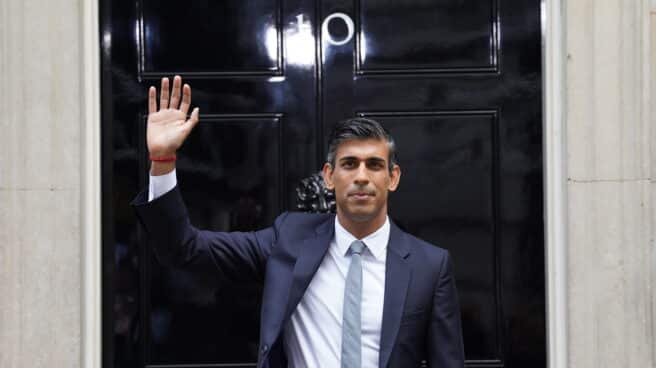

Rishi Sunak, the new British Prime Minister, at 10 Downing Street.
UK Economics Secretary Jeremy Hunt announced this Thursday a tax hike for individuals and companies to reduce net debt as a percentage of gross domestic product (GDP) by 2028. and cost reductions totaling €63,000 million. (55,000 million pounds) over the next five years.
After a disastrous budget presented by Liz Truss, this Thursday Hunt presented his project. The PM cuts from €171,000 (£150,000) to €143,240 (£125,140) the income threshold on which the highest income tax rate of 45% will be paid, while freezing rather than raising it share. tax-free income in order to reach more taxpayers in the coming years.
The conservative minister will also raise a temporary windfall tax on oil and gas companies from 25% to 35% and set a provisional rate of 45% on those surpluses for electricity producers.
It will also freeze the tax-free range of social security contributions and property transfer tax at current levels, while it will be reduced from €2,291 (£2,000) to €1,145 (£1,000) in 2023 and to €572 (£500). ). ) in 2024 dividends. Hunt has canceled the road tax exemption for electric vehicles and will raise the rate on commercial premises.
The minister also plans to cut public spending to balance public finances and provide confidence in financial markets, which have been destabilized since the fiscal plan unveiled on September 23 by former conservative government Liz Truss.
Hunt assured that public investment, which includes aid now reduced to the electricity bill, will continue to grow “in real terms” over the next five years, “but at a slower pace” and assured that essential public services will take precedence. .
Ministries will have to find “effective measures” to offset high inflation of over 11%, and the Defense Ministry will have a budget equivalent to 2% of GDP (compared to the Tory’s previously promised 3%).
The budget for international cooperation will remain at the level of 0.5% of GDP introduced during the pandemicfrom 0.7% earlier, and the National Health Service (NHS) will have to look for funds to save money, although it will receive an investment of 1,143 million euros (1,000 million pounds) this year, as well as 1,943 million euros (1,700 million pounds) for social assistance.
Hunt said social benefits and pensions will rise 10.1% next year, in line with inflation (measured last September).
Through tax increases and spending cuts, the executive branch, led by Rishi Sunak, expects to raise around 63,000 million euros (£55,000 million) over the next five years, a voluntary fiscal consolidation target.
Source: El Independiente